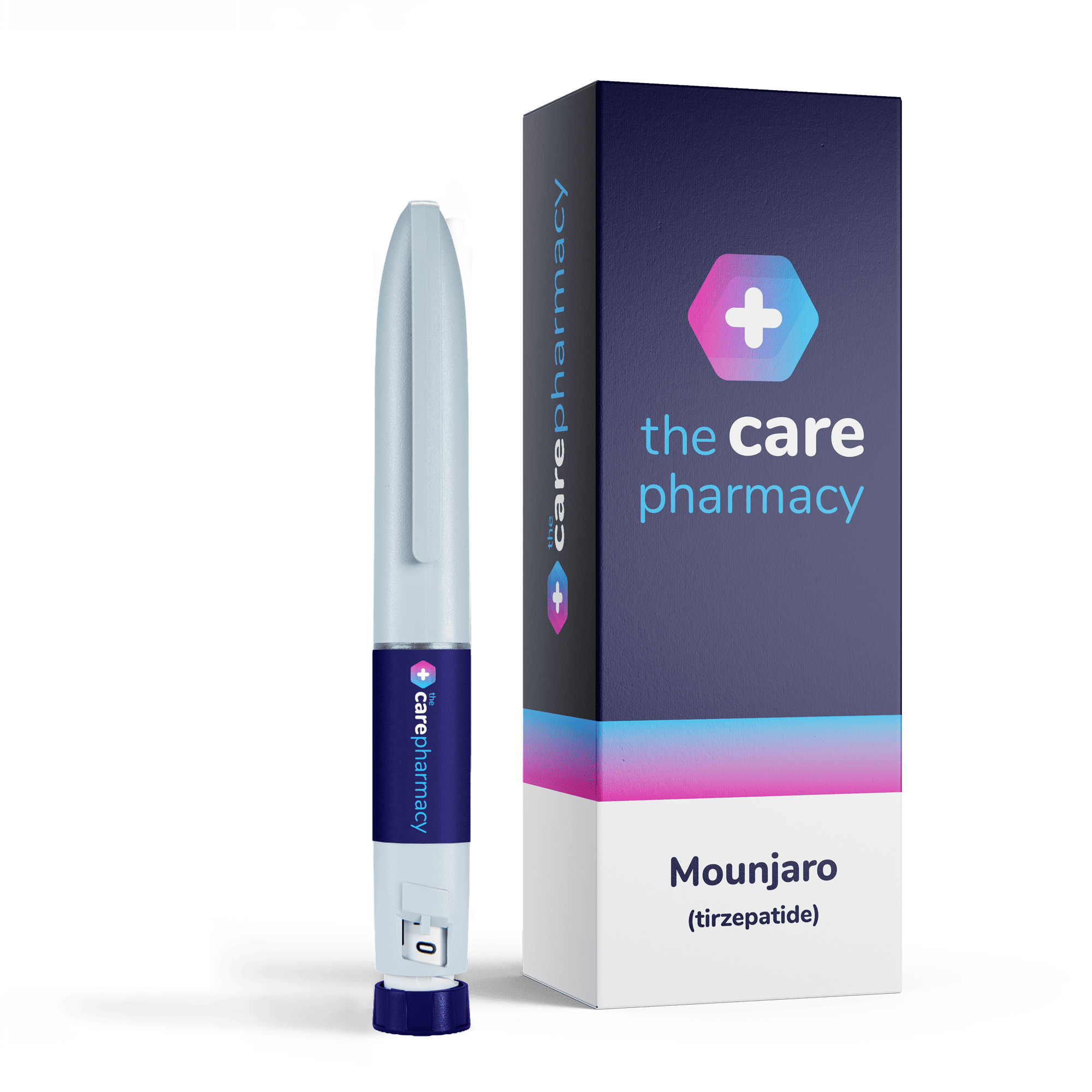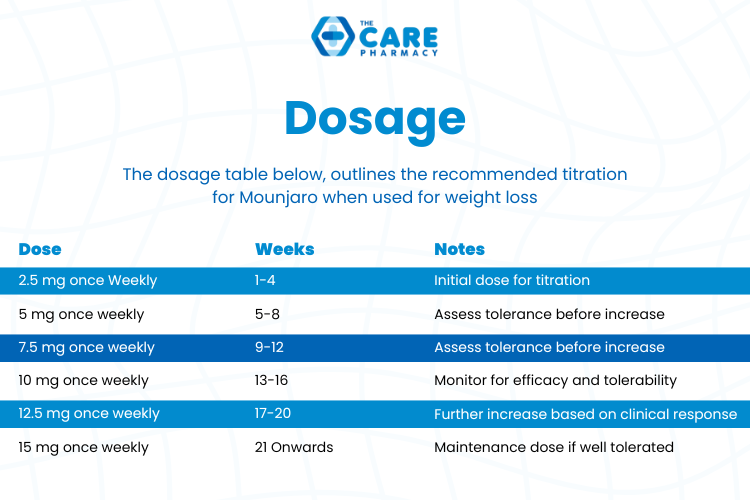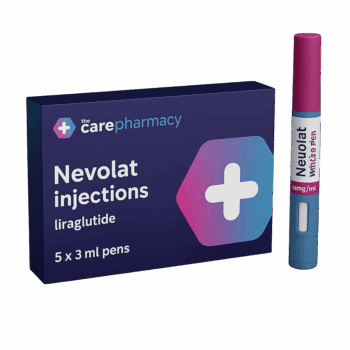What is Mounjaro?
Mounjaro is a prescription-only weekly injection used for weight loss and the management of type 2 diabetes. It contains tirzepatide, which helps reduce food cravings, increase feelings of fullness, and improve blood sugar control. In the UK, it was approved for weight loss in November 2023 and is available via private prescription following a clinical assessment.
Mounjaro is not a quick fix, but a supportive tool for people who have struggled to achieve results through diet and exercise alone. It works best when combined with a structured nutrition and activity plan, helping to support long-term weight management and metabolic health.
Before starting Mounjaro, it is important to understand:
- It is a once-weekly injection taken on the same day each week
- Doses are increased gradually to minimise side effects
- Results vary from person to person
- Ongoing clinical assessment and monitoring are essential
- It may not be suitable for individuals with certain medical conditions
Used correctly and under professional supervision, Mounjaro can form part of a safe and sustainable weight management plan.
What is Mounjaro used for?
Doctors prescribe Mounjaro injections to help:
- Control blood sugar in adults with type 2 diabetes when lifestyle changes alone don’t work
- Manage weight in adults with a BMI of 30+, or 27+ with conditions like high cholesterol or sleep apnoea
- Patients use it alongside a healthy diet and regular exercise to improve long-term health and overall wellbeing.
Mounjaro can be particularly helpful for people who experience strong hunger signals, frequent snacking, or cravings that make calorie control difficult. By supporting appetite regulation, it may make it easier to stick to a reduced-calorie diet and maintain healthier habits.
Mounjaro may also support improvements in weight-related health markers, such as:
- Waist circumference and body fat reduction
- Blood pressure in some patients
- Cholesterol levels, depending on lifestyle and overall health
- Better control over food choices and portion sizes
For many patients, the goal is not just weight loss on the scales, but improved energy levels, mobility, confidence, and long-term risk reduction for conditions linked to excess weight.
How do Mounjaro injections work?
Mounjaro contains tirzepatide, which mimics the effects of two natural hormones—GLP-1 and GIP. These hormones help manage blood sugar and appetite. Mounjaro:
- Triggers insulin release when blood sugar levels are high
- Lowers sugar production by the liver
- Slows digestion, helping you feel fuller for longer and curbing appetite
This dual action improves blood sugar control and supports long-term weight loss.
Many people notice that Mounjaro changes how they experience hunger and fullness. Some patients report feeling satisfied with smaller portions, thinking about food less often, and finding it easier to avoid impulsive snacking, especially in the evenings.
Step-by-step guide to using Mounjaro
-
Complete A Medical Consultation: Start by completing a full medical assessment with a regulated UK pharmacy or prescriber. Your BMI, medical history, and current medications will be reviewed to ensure Mounjaro is safe and appropriate for you.
-
Begin With The Starter Dose: Mounjaro treatment usually starts at 2.5mg once weekly for the first four weeks. This allows your body to adjust and helps reduce the risk of side effects.
-
Choose A Consistent Injection Day: Pick one day of the week and stick to it. Mounjaro should be taken on the same day each week, at any time of day, with or without food.
-
Prepare For Your Injection: Wash your hands, choose an injection site such as the abdomen, thigh, or upper arm, and ensure the area is clean and dry.
-
Administer The Injection: Use the pre-filled pen as instructed in the patient leaflet. Inject just under the skin and dispose of the pen safely in a sharps bin after use.
-
Rotate Injection Sites Weekly: Change your injection location each week to reduce irritation or skin discomfort.
-
Increase Dose Gradually: After four weeks, your prescriber may increase your dose depending on how well you tolerate the medication and your progress. Dose escalation continues gradually up to a maximum of 15mg if clinically appropriate.
-
Support Treatment With Lifestyle Changes: For best results, combine Mounjaro with a balanced diet, portion control, and regular physical activity.
-
Monitor Your Progress And Side Effects: Keep track of any side effects and your weight or blood sugar levels. Speak to your prescriber if you experience persistent or severe symptoms.
-
Attend Ongoing Reviews: Regular check-ins with your healthcare provider ensure your dose remains appropriate and your treatment continues safely and effectively.
Who is eligible for Mounjaro?
Mounjaro is prescribed for adults who meet specific clinical criteria for weight management or type 2 diabetes treatment.
For weight management, you may be eligible if you:
- Have a BMI of 30 kg/m² or above
- Or have a BMI of 27 kg/m² or above with at least one weight related condition, such as high blood pressure, high cholesterol, or pre diabetes
Eligibility is not determined by BMI alone. A clinician will also assess your overall health, medical history, and current medications to ensure Mounjaro is a safe and appropriate option for you.
You can request Mounjaro online through The Care Pharmacy by completing a medical consultation. Our GPhC registered prescribers review your information carefully to confirm suitability and minimise any potential risks.
Who is not eligible for Mounjaro?
Mounjaro is not suitable for everyone, and a full medical screening is required before starting treatment.
You may not be eligible if you:
-
Are pregnant, planning a pregnancy, or breastfeeding
-
Have a personal or family history of medullary thyroid cancer
-
Have Multiple Endocrine Neoplasia syndrome type 2 (MEN2)
-
Have experienced a serious allergic reaction to tirzepatide or any of its ingredients
-
Have certain significant gastrointestinal disorders
-
Are under 18 years of age
In some situations, Mounjaro may not be appropriate due to pregnancy, breastfeeding, or specific medical conditions. This is why an open and honest consultation is essential. A regulated UK pharmacy will assess your medical history, current treatment, and overall health to ensure Mounjaro is prescribed safely and responsibly.
What is the dosing schedule for Mounjaro?
Mounjaro is administered once weekly using a pre-filled injection pen. The starting dose is 2.5mg and is typically increased every four weeks, depending on how well you tolerate the medication and how your body responds. This gradual titration process helps reduce the likelihood of side effects.
Dosage increases step by step:
-
2.5mg – Starter dose taken once weekly for the first 4 weeks to allow your body to adjust
-
5mg – First treatment dose, usually taken for at least 4 weeks to begin supporting appetite control and blood sugar regulation
-
7.5mg – Optional escalation dose if additional support is needed
-
10mg – Higher dose to enhance effectiveness where clinically appropriate
-
12.5mg – Further step up dose for those tolerating treatment well
-
15mg – Maximum maintenance dose for long term weight management or blood sugar control
Not everyone will need to reach the highest dose. Your prescriber will determine the most appropriate schedule based on your progress, side effects, and overall health.
Mounjaro and my health
In addition to appetite control, the way Mounjaro supports blood sugar balance can be beneficial for people with insulin resistance. This is one reason it can be effective for weight management as well as type 2 diabetes, particularly when combined with consistent nutrition and movement habits.
Common effects people may notice while using Mounjaro include:
- Reduced appetite and fewer cravings
- Feeling full sooner during meals
- Less interest in high-fat or high-sugar foods
- More stable energy levels throughout the day
It is still important to eat regular, balanced meals while using Mounjaro. Skipping meals or eating too little can increase the risk of side effects like nausea, fatigue, or dizziness, and may make it harder to maintain results long term.
How much does Mounjaro cost?
| Dose | 1 Pen (4 Doses) | 2 Pens (8 Doses) | 3 Pens (12 Doses) |
|---|---|---|---|
| 2.5mg | £149.99 | £299.98 | £449.97 |
| 5mg | £184.99 | £369.98 | £554.97 |
| 7.5mg | £234.99 | £469.98 | £704.97 |
| 10mg | £259.99 | £519.98 | £779.97 |
| 12.5mg | £279.99 | £559.98 | £839.97 |
| 15mg | £299.99 | £599.98 | £899.97 |












Paul (verified owner) –
Excellent weight loss treatment just a bit pricey
Helen Shinkwin (verified owner) –
The website isn’t very user friendly, however the instant messaging service is brilliant and any problems are sorted quickly, within minutes. Speedy delivery
Princess Yeboah Manu –
Very good
Mrs Emma Cook (verified owner) –
Returned to mounjaro after trying wegovy as although wegovy was cheaper it was less effective. Returned at lowest dose to start again to get last couple of stone off, hopefully without having to go up too many mg
Sian (verified owner) –
Very happy with the service quick easy and received my parcel on time will definitely use again
Alison Timms (verified owner) –
great swift service